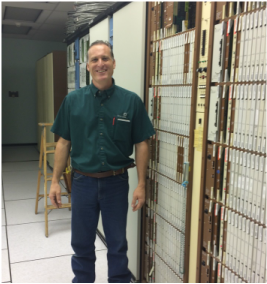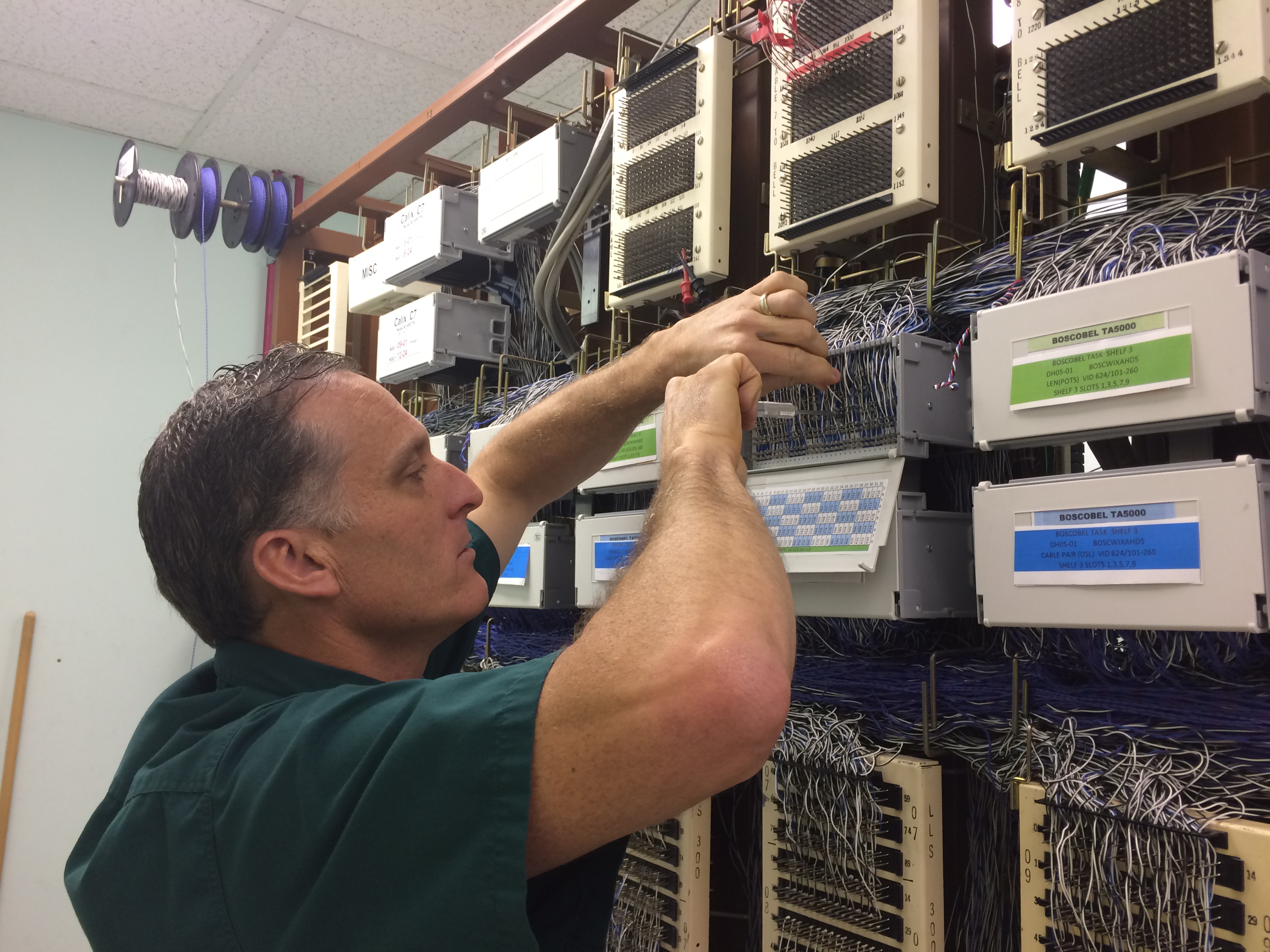| By today’s standards, the year 1960 is not generally known for its cutting-edge technology. But this is the year that the telecommunications equipment was installed that Jason Rider still uses 56 years later (long before he was born!) Jason is pictured here next to the archaic but still functioning system. In a day when we expect everything to be small and sleek, the monstrosity that is their phone system was a bit shocking to me. It was so large and bulky that you might expect the interior to have actual female phone operators sitting inside connecting each call one at a time. This was just part of the fascinating look into the daily operations of a national phone carrier operating in a small town. |
We see technology changing almost every day. When we have more computing power in our smartphones than in the room-sized equipment in the Boscobel office, of course one wonders why and how they could still be using such old equipment. The company Jason works for is caught between the proverbial rock and a hard place. When the U.S. government broke up the monopoly of “Ma Bell” (AT&T) and her baby Bells in the 1980’s, deregulation of the phone carriers initially helped businesses like Jason’s. Smaller providers were given a more level competitive playing field in order to expand their customer base and build their business. This began the hey-day of many local and national phone carriers—countless employees were hired, salaries grew and customers were happy.
But the same rules governing deregulation are now hurting the larger phone carriers. By law, Jason’s company has to provide local phone service for designated areas. However, with expanding cell phone usage and a corresponding reduction in landlines, the company has had to shut several local offices. This means that each remaining office is now responsible for a much larger area of service. In addition to being shocked at some of the equipment, I was surprised to learn that on most days, Jason was the sole employee in a multi-story building where dozens of employees used to work. It’s just Jason and one on the road technician covering parts of multiple counties.
But the same rules governing deregulation are now hurting the larger phone carriers. By law, Jason’s company has to provide local phone service for designated areas. However, with expanding cell phone usage and a corresponding reduction in landlines, the company has had to shut several local offices. This means that each remaining office is now responsible for a much larger area of service. In addition to being shocked at some of the equipment, I was surprised to learn that on most days, Jason was the sole employee in a multi-story building where dozens of employees used to work. It’s just Jason and one on the road technician covering parts of multiple counties.
| Declining use of landlines has also meant that it is not cost effective to invest in new equipment to service this shrinking portion of their business. This is the reason they hobble along using 56 year-old equipment. They are not exactly ‘Macgyvering’ the antiquated equipment with bubble gum and shoe strings, but it almost felt like that would be the case. With strict supervision, Jason allowed me to make a new landline connection in their service area. One might think a click of a mouse would do the trick, but it actually involved several connections of tiny wires and links. |
There were, however, other parts of the facility with true cutting-edge technology. The tubes of fiber optic cables and the room full of back-up batteries were curious examples of the modern intersecting with the ancient—sort of the telegraph meets the cell phone tower kind of thing.
This experience gave me a much greater appreciation of the unique challenges that Jason faces every day. From knowing his character, I know that Jason confronts those challenges with integrity and fortitude. Like all of the “men at work” I have visited, Jason pulls himself out of bed each day and heads to the office both because he ‘wants to’ and because he ‘has to.’ God has wonderfully given him a depth of expertise and creativity that he joyfully applies to his work. That’s the ‘want to’ portion. The Lord means this to give us a sense of fulfillment and accomplishment, but without turning us into workaholics. As Jason and his wife Becki shepherd their four growing boys, his work life inevitably takes center stage in their family. That’s the ‘have to’ part of the work equation. Bills pile up whether we like it or not.
It is a joy to have the Riders in our church family. They are a sweet family who are integrated into and serving in multiple area of our body life. Hopefully I now have a better understanding of how to pray for and support Jason in his work and family life.
This experience gave me a much greater appreciation of the unique challenges that Jason faces every day. From knowing his character, I know that Jason confronts those challenges with integrity and fortitude. Like all of the “men at work” I have visited, Jason pulls himself out of bed each day and heads to the office both because he ‘wants to’ and because he ‘has to.’ God has wonderfully given him a depth of expertise and creativity that he joyfully applies to his work. That’s the ‘want to’ portion. The Lord means this to give us a sense of fulfillment and accomplishment, but without turning us into workaholics. As Jason and his wife Becki shepherd their four growing boys, his work life inevitably takes center stage in their family. That’s the ‘have to’ part of the work equation. Bills pile up whether we like it or not.
It is a joy to have the Riders in our church family. They are a sweet family who are integrated into and serving in multiple area of our body life. Hopefully I now have a better understanding of how to pray for and support Jason in his work and family life.


 RSS Feed
RSS Feed
